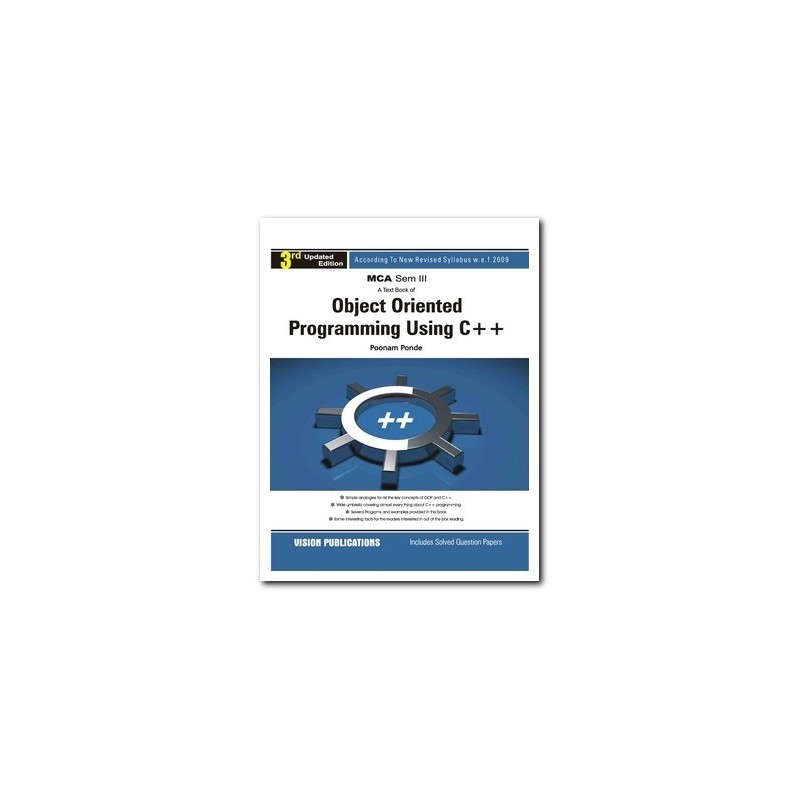Email: tovisionpune@gmail.com



According to New Revised Syllabus w.e.f. 2009 PUNE, Maharashtra (INDIA)
Text Book of Object Oriented Programming using C++
MCA Sem-III
Author : Poonam Ponde
Book ID : 1126A
Contents
1. Object Oriented Concepts
1.1 What is object-oriented?
1.2 What is object-oriented development?
1.3 Object-oriented methodology
1.4 Overview of procedure-oriented programming
1.5 What is object-oriented programming?
1.6 Object oriented languages
2. Introduction to C++
2.1 A brief history of C and C++
2.2 Differences between C and C++
2.3 Features of C++
2.4 Advantages and disadvantages of C++
2.5 Applications of C++
2.6 Writing and executing a ‘C++’ program
2.7 Program structure and rules
2.8 Sample C++ program
2.9 Comments
2.10 Return type of main()
2.11 Namespace STD
2.12 Header file
2.13 Output statement (Cout)
2.14 Input statement (Cin)
3. Expressions
3.1 Introduction
3.2 C++ tokens
3.3 Data types
3.4 Declaration of variables
3.5 Initialization of variables
3.6 Reference variables
3.7 Operators
3.8 Type cast operator
3.9 Memory management operators
3.10 Expression
3.11 Statement
3.12 Symbolic constant
3.13 Type compatibility
4. Functions in C++
4.1 Introduction
4.2 Passing information – parameters
4.3 Default arguments
4.4 Constant arguments
4.5 Function overloading
4.6 Inline functions
4.7 Recursive functions
5. Classes and Objects
5.1 Introduction
5.2 Class
5.3 Member functions
5.4 Making an outside function inline
5.5 Nesting of member functions
5.6 Private member function
5.7 Arrays within a class
5.8 Memory allocation for objects
5.9 Arrays of objects
5.10 Objects as function arguments
5.11 Returning objects
5.12 Const member function
5.13 Static class members
5.14 Pointer to members
5.15 Local classes
5.16 Friend functions
5.17 Unions and classes
6. Constructor and Destructor
6.1 Introduction
6.2 Constructor
6.3 Multiple constructors in a class
6.4 Constructor with default argument
6.5 Dynamic initialization of objects
6.6 Const object
6.7 Destructor
7. Operator Overloading and Type Conversion
7.1 Introduction
7.2 Overloading unary operators
7.3 Overloading binary operators
7.4 Limitations of operator overloading
7.5 “This” pointer
7.6 Overloading << and >> Operators
7.7 Manipulation of string
7.8 Type conversion
8. Inheritance
8.1 Introduction
8.2 Single inheritance
8.3 Multiple inheritance
8.4 Multilevel inheritance
8.5 Hierarchical inheritance
8.6 Hybrid inheritance
8.7 Container classes
8.8 Virtual base classes
8.9 Constructors in derived classes
8.10 Destructors in derived classes
8.11 Nesting of classes
8.12 Pointers to derived classes
8.13 Virtual functions
8.14 Pure virtual functions
8.15 Abstract classes
9. The C++ I/O System Basics
9.1 Introduction
9.2 C++ stream
9.3 C++ stream classes
9.4 Unformatted I/O operations
9.5 Formatted I/O operations
9.6 Manipulators
10. Working with Files
10.1 Introduction
10.2 Creating a stream
10.3 Opening a file
10.4 Closing a file
10.5 Checking for failure with file commands
10.6 Detecting the End-of-File
10.7 File pointers and their manipulation
10.8 Reading / writing a character from a file
10.9 Write() and Read() Functions
10.10 Buffers and synchronization
10.11 Other functions
10.12 Random access file processing
10.13 Updating a File: Random Access
10.14 Command line arguments
11. Templates
11.1 Introduction
11.2 Generic functions
11.3 A function with two generic data types
11.4 Explicitly overloading a generic function
11.5 Overloading function templates
11.6 Using standard parameters with template functions
11.7 Generic functions restrictions
11.8 Applying generic function: Generic Sort
11.9 Generic classes
11.10 An example with two generic data types
11.11 Using non-type arguments with generic class
11.12 Using default arguments with template classes
11.13 Template parameters
11.14 Template specializations
11.15 The typename and export keywords
12. Exception Handling
12.1 Introduction
12.2 Exception mechanism
12.3 Using multiple catch statements
12.4 Catch-all exception handler
12.5 Nesting try-catch blocks
12.6 Exception specifications
12.7 Unexpected exception
12.8 Throwing an exception from handler
12.9 Uncaught exception
13. Standard Template Library
13.1 Introduction
13.2 The StL programming model
13.3 Containers
13.4 Algorithms
13.5 Iterators
13.6 Function objects
13.7 Allocators
13.8 Adaptors
14. Namespace
14.1 Introduction
14.2 Defining a namespace
14.3 The standard namespace
14.4 Nested namespace
14.5 Unnamed namespace
14.6 Namespace alias
15. New Style Casts and RTTI
15.1 Introduction
15.2 New-style casts
15.3 Static_cast
15.4 Dynamic_cast
15.5 Const_cast
15.6 Reinterpret_cast
15.7 Run-Time Type Information (RTTI)
15.8 A simple application of run-time type Id
15.9 Typeid can be applied to template classes
Solved Question Papers - October 2011